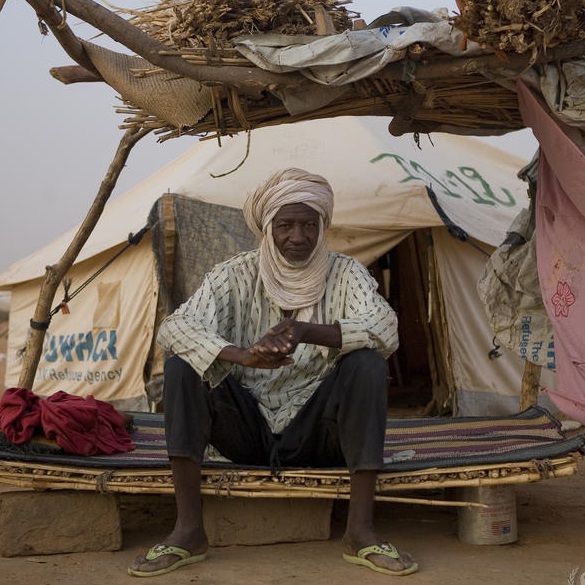WASH KAP Survey Diffa region, Sayam Forage - August 2018
Niger, 2018
Get MicrodataIdentification
UNHCR_NER_KAP_2018_SAYAM_v2.1
WASH KAP Survey Diffa region, Sayam Forage - August 2018
Enquête CAP EHA dans les sites de refugies - Août 2018
| Name | Country code |
|---|---|
| Niger | NER |
The security situation resulting from the Boko Haram crisis on the border area of Nigeria, at the end of 2014, caused huge population movements and large influxes to Niger of people, including Nigerian refugees, returned Nigerians and other nationalities (Chadians, Cameroonians etc.). With the attacks of the Nigerian towns of Bosso and Diffa by the Boko Haram in February 2015, the islands of Lake Chad and villages along the Komadougou (Nigeria border), the phenomena have worsened, increasing the population's displacements inside the Diffa region itself.
These newly displaced populations have been added to the previously affected groups. The situation for the period of November 2016 shows that approximately 302,407 displaced persons live in the Diffa region including refugees (88,688), returnees (29,315) and internally displaced persons (184404). This situation prompted authorities to allow the opening of the Sayam Forage refugee camp, with 12,000 refugees and returnees from Nigeria.
To prevent the spread of hygiene and sanitation-related diseases in these camps, Action Pour le Bien-Etre (APBE), financially supported by UNHCR, conducted WASH activities on this camp. A KAP (knowledge, attitudes and practices) survey was conducted in August 2018 (266 households were interviewed). The study made it possible to note the positive impacts of the WASH initiatives on the populations, thanks to the construction of 19 fountains, creation and training of water point management committees to ensure the hygiene of water points, promotion of good hygiene practices and sanitation. In addition, this study made it possible to observe some points of weakness that should to be addressed, in particular the knowledge of diseases and the causes and prevention of malaria. Furthermore, the idea of construction of other community latrines is to be deepened in the future.
Household
Version
2.1: Edited, anonymous dataset for licensed distribution.
Scope
The survey includes the following topics:
- Household main characteristics
- Sources of drinking and non-drinking water
- Information about water collection
- Hygiene of drinking water
- General hygiene practices
- Hand-washing habits and knowledge
- Defecation habits and latrine types
- Waste disposal
- Diarrhea
| Topic |
|---|
| Health |
| Water Sanitation Hygiene |
Coverage
Sayam Forage camp, region of Diffa
Producers and sponsors
| Name |
|---|
| UNHCR |
Sampling
The households to be surveyed were randomly selected with the following methodology:
- The number of households to be surveyed for each neighborhood was determined to be proportional to the total number of households in that neighborhood.
- The random selection of households was done by interviewers within the neighborhoods directly in the field during the investigation. The random selection method was the following: according to the configuration of each district, the investigator placed himself at the central point of the district and interviewed all households encountered while taking X steps (X is variable according to the size of the population).
Sample weights for the household data were computed dividing, for each neighborhood or quartier, the population by the sample size.
Survey instrument
The survey questionnaire used to collect the data consists of the following sections: General Information and Demographics, Water Collection and Storage, Drinking Water Hygiene, Hygiene, Female Hygiene, Sanitation, Sensibilisation, Diarrhoea.
Data collection
| Start | End |
|---|---|
| 2018-08-06 | 2018-08-10 |
| Name |
|---|
| Action Pour le Bien Être |
This investigation was carried out by eight investigators, under the supervision of four survey supervisors and one survey manager. These investigators, supervisors and survey manager had been identified and trained for two days before the start to learn about data collection techniques, verification before validation of forms and smartphone management. This allowed investigators to familiarize themselves with the collection tools. The training consisted of one day of theoretical training and another day of pilot testing to become familiar with the tools.
A team consisted of one investigator supported by a translator (community intermediary). A supervisor could ultimately supervise two or more interviewers depending on the arrangement of the households in the camp.
Data processing
Data was anonymized through decoding and local suppression.
Data Access
Cite this data as follows:
UNHCR (2018) WASH KAP Survey Diffa region, Sayam Forage - August 2018. UNHCR microdata library: https://microdata.unhcr.org
Contacts
| Name | Affiliation | |
|---|---|---|
| Curation team | UNHCR | dencomdl@unhcr.org |
Metadata production
UNHCR_NER_2018_KAP_Sayam_DDI_v1.0
| Name |
|---|
| UNHCR |
